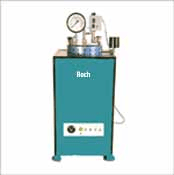Laboratory Cement Autoclave
Roch Mechatronics Inc. Cement Autoclaves are double walled units. Outer body of our lab autoclaves is constructed out of thick sheet duly pre-treated with primers and rust proofing and painted with long lasting stove enamel or elegantly powder coated. The inner cylinder of this Cement autoclave is made of heavy gauge welded steel sheet. Our autoclaves are air insulated from inside, however we may incorporate mineral glass wool insulation in the Lab autoclaves if the customer desires so. The strong lid of our Laboratory Autoclave constructed out of thick steel plate which is lined from inside with Stainless steel sheet of ss-304 grade has a wing nut locking arrangement for locking system in the Autoclaves.
Features of Cement Autoclave :-
- Wing nut lock locking mechanism for ultimate ease of operation and safety is provided in our Laboratory Autoclave.
- Huger grade spring loaded safety valve of brass, duly chrome plated is a unique feature of our Cement Lab Autoclave.
Frequently Asked Questions (FAQ)
A laboratory cement autoclave is a specialized equipment used to determine the soundness and expansion properties of cement. It subjects cement specimens to high-pressure steam and temperature to simulate curing conditions.
A laboratory cement autoclave is a specialized equipment used to determine the soundness and expansion properties of cement. It subjects cement specimens to high-pressure steam and temperature to simulate curing conditions.
Soundness testing helps ensure that the cement does not expand excessively after setting. Excessive expansion can lead to cracks in concrete structures, affecting their integrity.
The autoclave exposes cement samples to high-pressure steam inside a sealed chamber, typically at 21 ± 1°C. This simulates the conditions of curing in a controlled environment.
The Le-Chatelier test measures the change in length of a cement bar when subjected to an autoclave. It helps determine the soundness of cement and its ability to maintain its volume during curing.
Cement autoclaves are specifically designed for cement testing and should not be used for other materials. Using them for other purposes may affect their accuracy and functionality.
Safety measures include wearing appropriate personal protective equipment, ensuring the autoclave is properly vented, and following all operating and safety instructions provided by the manufacturer.

